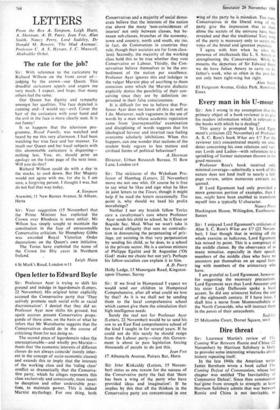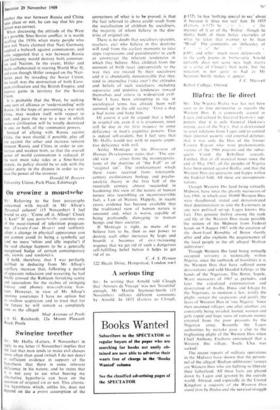Dire threat
Sir: Laurence Martin's review of The Corning War Between Russia and China (22 November) by Harrison Salisbury is likely to provoke some interesting wisecracks about history repeating itself.
In the late 1940s the American writer James Burnham wrote a book called The Coming Defeat of Communism, whose last chapter was entitled The Inevitability of Communist Defeat'. Since then communism hag'ibne from strength to strength; at least Harrison Salisbury admits that war between Russia and China is not inevitable, so sfiether the war between Russia and China sates place or not, he can say that his pre- diction was correct. When discussing the attitude of the West to a possible Sino-Soviet conflict, it is worth recalling the 1930s when many people who were not Nazis claimed that Nazi Germany supplied a bulwark against communism, and some suggested that a war between Russia and Germany would destroy both commun- ism and Nazism. In the event, Hitler and Stalin collaborated in starting World War II, and even though Hitler reneged on the Nazi- Soviet pact by invading the Soviet Union, the result was the destruction of both Euro- pean civilisation and the British Empire. and massive gains in territory for the Soviet Union.
It is probable that the West, by seeking some sort of alliance or 'understanding' with Russia, in the hope of preventing a war with China, may weaken itself with respect to both, and pave the way to a war in which western civilisation will be totally destroyed by one, or both, of the 'communist powers.
Instead of allying with Russia against China, the west should, if possible, play off one against the other and increase tension between Russia and China in order to em- barrass and weaken both, so that the overall power of world communism is reduced. If the west must take sides in a Sino-Soviet dispute, its policy should be to side with the weaker party in the dispute in order to re- duce the power of the stroneer.
Donald M. Bowers University Union, Park Place. Edinburgh











































 Previous page
Previous page